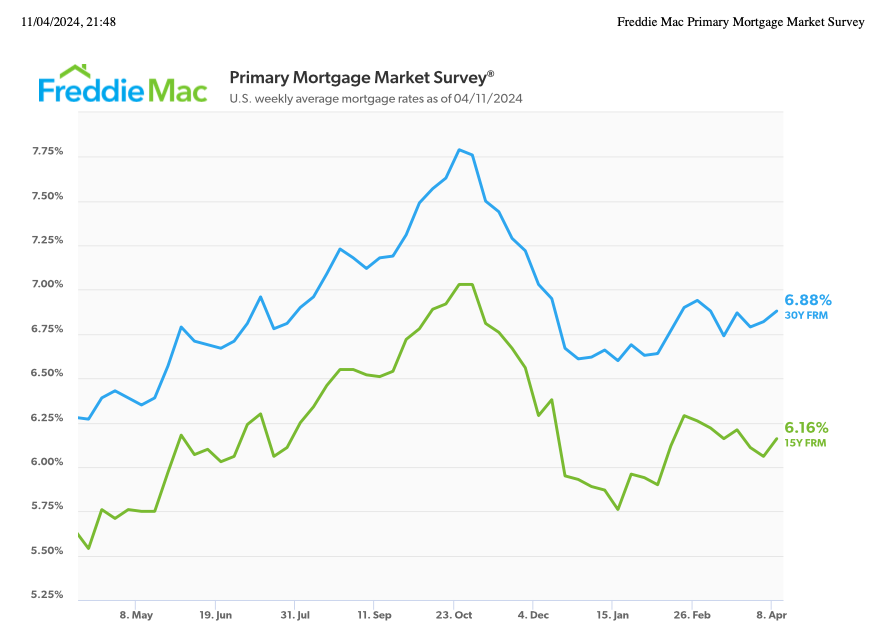Zinger Key Points
- Mortgage rates surge, with the 30-year fixed rate hitting 6.88%, raising concerns for homebuyers and economists alike.
- Despite flat inflation data, the financial market's reaction suggests uncertainty, prompting questions about the future of mortgage rates.
- Feel unsure about the market’s next move? Copy trade alerts from Matt Maley—a Wall Street veteran who consistently finds profits in volatile markets. Claim your 7-day free trial now.
The recent spike in national mortgage rates stirred concerns among homebuyers and economists alike. With the 30-year fixed-rate mortgage (FRM) climbing to 6.88% on April 11, questions arise about the trajectory of the housing market.

Chart Source: Freddie Mac
Additionally, other key indicators such as the 15-year fixed mortgage rate, which rose to 6.16%, signaled a broader trend of rate hikes.
Stubborn Inflation And The Fed To Blame
Per Freddie Mac, mortgage rates have gradually increased through the year, due to persistent inflation and the reassessment of the Federal Reserve’s monetary policy trajectory.
The latest inflation figures from March indicate minimal change, but the financial market’s response presents a contrasting economic outlook. The March estimate of 3.5% annual inflation growth fell within the range of 3.1% to 3.7%, while the Dow Jones Industrial Average experienced a significant decrease following the announcement. This is reminiscent of the unmet expectations of a recession from a year prior.
Worst Day For Mortgage Rates Since October 2022
On April 10, the average lender experienced a mortgage rate hike by 0.28%, almost equivalent to the 0.29% rise observed after the Feb. 2 jobs report. Mortgage News Daily described this as “basically the worst day for mortgage rates since October 2022.”
Many analysts anticipated mortgage rates to drop below 7% in the current year. However, persistent inflation figures prevent rates from reaching the desired lower levels.
McBride’s Musings: An Expert’s Take
Greg McBride, CFA, chief financial analyst for Bankrate, said the uncertainty persists regarding whether the current inflationary trend is temporary or posed a substantial threat to the progress made in reducing inflation in 2023. He suggested that until there was a clearer consensus on the trajectory of inflation, it would be challenging for mortgage rates to significantly and consistently decline below 7 percent.
Despite hopes for rates to dip below 7%, stubborn inflation numbers thwart expectations, posing challenges for prospective homebuyers and the housing market as a whole.
"The housing market will continue to be characterized by high home prices, high financing costs, and a limited number of homes for sale," McBride told Benzinga in an exclusive interview.
This might spell good news for those invested in the Vanguard Real Estate Index Fund ETF VNQ, the Schwab US REIT ETF SCHH, the Real Estate Select Sector SPDR Fund XLRE and the iShares U.S. Real Estate ETF IYR. Rising home prices often reflect a healthy real estate market, which can boost the value of real estate assets held within these ETFs.
However, investors in mortgage ETFs such as the iShares MBS ETF MBB and the Vanguard Mortgage-Backed Securities Index Fund ETF VMBS may want to remain wary of their holdings.
The Affordability Abyss
As experts weigh in on the implications of these developments, the affordability crisis deepens, compounded by limited housing inventory and stagnant wage growth. While navigating this landscape, the question is: are we witnessing the beginning of a sustained upward trend in mortgage rates?
Photo: Shutterstock
Edge Rankings
Price Trend
© 2025 Benzinga.com. Benzinga does not provide investment advice. All rights reserved.
Trade confidently with insights and alerts from analyst ratings, free reports and breaking news that affects the stocks you care about.